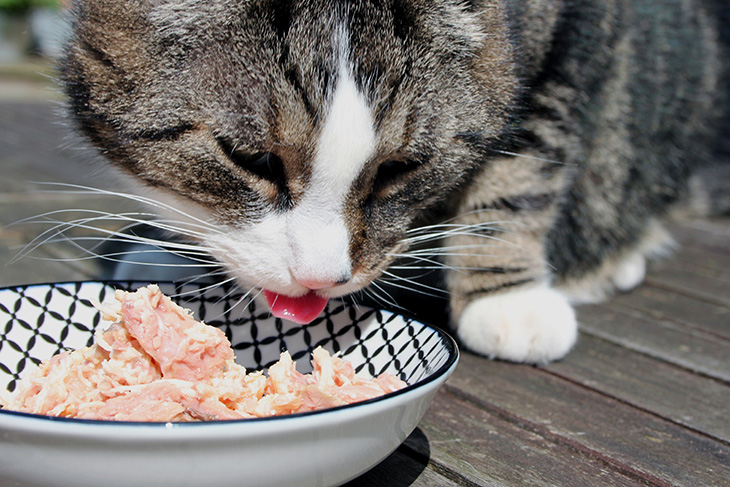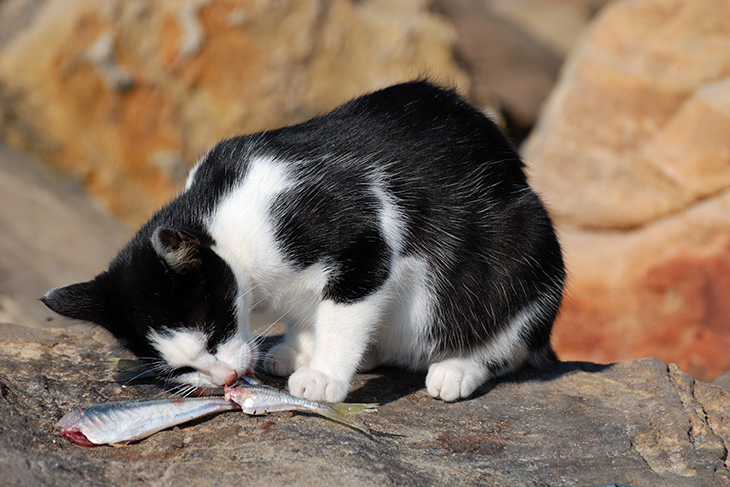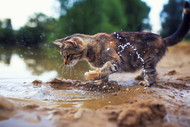Something Fishy
29th Aug 2023
Something Fishy

The domestic cat’s ancestors were desert dwellers with little opportunity to dine on fish. Despite this, fish is a very popular ingredient in commercial pet food.
Many of our customers have wondered why we do not sell fish products. As a result, in this newsletter, we have decided it was time to provide the reasons for this.
Here at Purrform, we are protein lovers. Our belief that feeding a high protein diet is the absolute best that a cat can have, stems from intense research into the origins of cats and their dietary requirements.
It is a fact that fish does contain high amounts of protein, but with this comes many negatives that most people are unaware of. Many cats are sensitive or even allergic to fish. It is in fact, one of the top three most common feline food allergens around.
Fish is unsafe for daily feeding. Most of it is contaminated with mercury, industrial chemicals, and toxic preservatives that cannot be removed for production. Research published in 2016 revealed that many commercial cat and dog foods contain high levels of mercury, especially formulas containing fish.
Most fish used in canned pet foods comes from the decaying leftovers of the seafood industry around the world. It is a mix that’s high in phosphorus and magnesium, and all sorts of pollutants that have been dumped into the sea, and other nasty stuff that is impossible to remove without also removing the benefits.
Also, the fish used in canned pet foods usually includes bones and is high in phosphorus and magnesium, which can be an issue in cats with a history of urinary tract disorders or kidney disease. A diet overloaded with the mineral magnesium can predispose your kitty to magnesium ammonium phosphate crystals, also known as MAP crystals or struvite crystals. Excess phosphorus is dangerous for kitties with kidney disfunction and the levels of phosphorus found in fish are very high.

Cats fed on a high fish diet, especially in poorly formulated and/or poor quality foods, can ultimately lead to thiamine deficiency which can cause a loss of appetite, seizures, and even death.
Fish can supply a good amount of protein that is very usable by cats’ bodies but some kinds of fish can also destroy certain vitamins. Raw fish is unsuitable for cats as it contains an enzyme called thiaminase that destroys thiamine, which is an essential B vitamin for your cat. If cats have too little thiamine, they may experience some severe health problems.
It means that while fish may provide your cat with the protein it needs, it is deficient in various vitamins and minerals that your cat needs for a healthy diet. Fish for cats should, therefore, always be an occasional treat.
To make matters worse, the fish in pet food is heavily preserved during the manufacturing process, often with a chemical preservative called ethoxyquin, which is known to cause cancer. Ethoxyquin is banned in human food, except in very small quantities allowed as preservatives in spices.
Although seafood is a very rich source of Iodine, cats’ bodies don’t require a lot of iodine. Many animal nutritionists believe there’s a link between cats consuming too many Iodine rich foods and Feline Hyperthyroidism.
We have seen some companies claiming the need for fish is to obtain the omega 3 fatty acid DHA from the fish oils but the reality is, a nursing queen naturally develops this amino acid while nursing her babies.

Fish oil supplements, despite not being harmful to cats, do have side effects such as gastrointestinal discomfort and oily, flaky skin and fishy odour on the breath or skin.
We conclude this newsletter by explaining that the downsides to feeding fish as a daily meal, are endless. We believe that cats in the wild would not necessarily be hunting for fish to eat and this is due to the reasons mentioned. Fish are not natural prey for cats. They may make up the occasional meal, in rare cases, but would certainly never be eaten in quantity. Although feeding cooked fish from time to time, will not harm your fur baby, it is not recommended as a stable diet.
At Purrform, we use premium quality, human-grade, meat protein which is highly palatable and digestible. Meat protein contains many of the essential nutrients and amino acids necessary for a cat’s healthy existence and does not come with any of the disadvantages associated with fish protein.
References
- Animal Feed Science and Technology, Volume 222, December 2016, Pages 190-193
- CarsonNOW.org, May 3, 2021
- Techna

